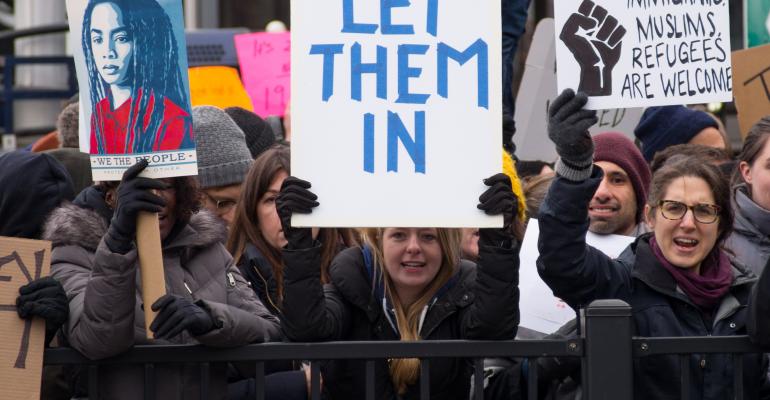Just as key components of Executive Order 13780 concerning issuing visas to citizens of certain Muslim-majority countries were due to expire, the Trump administration announced changes to the order to remove one country from the list and add three more. The original travel ban, issued on January 27, affected citizens from Iran, Iraq, Libya, Somalia, Sudan, Syria, and Yemen applying for visas to visit the United States, and put a moratorium on accepting refugees. In this third iteration of the order, Sudan was removed from the list and three new countries, North Korea, Chad, and Venezuela, were added. (Iraq was removed from the list in a previous update.) Oral arguments on the travel ban were due to be heard by the Supreme Court on October 10, but the justices have postponed the hearing to determine if the original case—that the ban was unconstitutional because it was directed at Muslims—is still valid.
The first two presidential orders were blocked by lower courts but were allowed to go into effect with restrictions pending the Supreme Court hearing.
Despite the inclusion of non-Muslim–majority countries Venezuela and North Korea, Secretary of State Rex Tillerson on Sunday said that, “This order is part of our ongoing efforts to eliminate vulnerabilities that radical Islamic terrorists can and will exploit.”
Under the new executive order the Department of Homeland Security will review each countries’ ability to provide security information and traveler identities and determine whether they are in compliance with U.S. standards before they can apply to be removed from the list.
The Executive Director and COO of the Global Business Travel Association, Michael W. McCormick said, “The White House has now established clearer criteria and a process for evaluating the admission of foreign visitors into the United States as well as a willingness to engage with other countries to assist them in meeting the mutual beneficial goal of safe travel.” But he warned that, “Damage from the previous executive orders has been done. The initial comprehensive January and March travel bans have created the perception that the United States is closed for business. While security is paramount, the White House should now work to counter that perception. The resulting losses in business travel and trade have left a lasting negative impact on our economy.”
U.S. Travel Association Executive Vice President for Public Affairs, Jonathan Grella, issued a statement on the changes to the travel ban. He said, “Security adjustments rooted in legitimate concerns will always be a fact of life for travelers. It's essential that changes be clearly communicated and that there be both an incentive and a pathway for affected countries to bring themselves back into compliance, and the Department of Homeland Security and State Department have been doing a good job checking those boxes.” However, he added that, “The American travel community continues to feel that both security and economic objectives could benefit from a clear message that these policy moves are tailored to specific issues. The world needs to know that they are not intended to discourage travel generally, and that legitimate business and leisure travelers are as welcome as ever in the United States.”
Unlike the first version of the ban, this one is not expected to cause travel chaos as the administration has said that any current visas issued for travel are still valid, and the conditions only apply to new visa applications.





